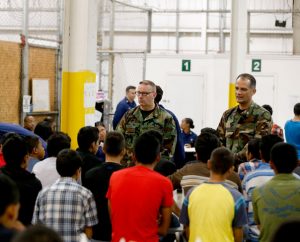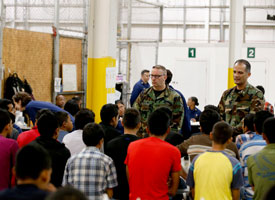More than 45 Lutheran Immigration and Refugee Service (LIRS) partners are providing care and services to help the influx of unaccompanied immigrant children crossing the southern U.S. border in response to what is being called a humanitarian crisis.

That support is being provided at the request of the U.S. Department of Health and Human Services’ Office of Refugee Resettlement — the government body with whom LIRS has worked as an “advocate and strong partner” for the past decade on behalf of the safety of unaccompanied immigrant children, said Kimberly Haynes, LIRS director of Children’s Services.
LIRS was asked “to expand and engage networks” to help meet the growing needs of thousands of children, including many fleeing “horrific” situations in Central America, Haynes said.
“They are coming because they have no options. It’s die [in their homelands] or die trying [to escape],” Haynes said of the children who are mostly from Guatemala, Honduras and El Salvador.
Since October, more than 47,000 children have been caught trying to illegally cross the Mexican border. That number is expected to hit 90,000 by the end of September, according to news stories citing the Obama administration.
Most of the youngsters left their native countries due to extreme poverty, human trafficking, drug cartels, political upheaval, child labor and abusive homes, according to written information prepared by LIRS.
Some 14,000 immigrant children or family members involved with this crisis have received services through LIRS partners, Haynes said, including Lutheran Social Services of Michigan; Lutheran Community Services Northwest; Lutheran Children and Family Services, Pennsylvania; and Lutheran Social Services of the National Capital Area, Washington, D.C.
That support includes foster care, transitional care, family education, counseling and assistance for families trying to reunite with their children.
LIRS planned to host regional calls with Lutheran agencies and congregations the week of June 22 in five areas where the U.S. government has opened shelters for the unaccompanied children. Those calls aim to “provide awareness and understanding” so LIRS partners “can be engaged when the opportunity comes that action can be taken,” Haynes said.
What Haynes terms “governmental red tape” has limited efforts by LIRS partners to get involved with the care of immigrant children who are temporarily housed at government shelters on military bases in San Antonio and Brownsville, Texas; Ventura County, Calif.; and Fort Sill, Okla. Immigrant children also are being sheltered at a FEMA facility in Nogales, Ariz.
While acknowledging that thousands of unaccompanied immigrant children present a complicated and controversial issue, Haynes says it’s also a crisis fraught with “misconceptions and misunderstandings.”
Instead of coming to the U.S. for purely economic reasons or to take advantage of immigration reform, Haynes says that many of these immigrants are seeking safety. She spoke of “children as young as 2 years old” and a 16-year-old pregnant mother who saw her husband killed.
In addition to the U.S., the Central American immigrants also are fleeing to Mexico, South America and the Caribbean, Haynes said.
As unaccompanied immigrant children make news headlines, LIRS is fielding questions about the crisis. Haynes notes an increase in interest in foster-care opportunities directed to the LIRS “Give the Gift of Family” campaign. For information about that campaign, visit http://lirs.org/fostercare.
“What an amazing gift [foster care] can be to a child coming out of such a horrific background,” she said.
Likewise, the Rev. Dr. Carlos Hernandez, director of Church and Community Engagement with the LCMS Office of National Mission, says the immigrant children’s plight is on the minds of some LCMS members.
The crisis “offers us the opportunity to ‘roll up our sleeves’ and put our mercy pronouncements into action as the Lord commands us to do,” said Hernandez, citing Luke 6:36 and Matthew 25:35.
“We cherish our mercy-ministry partners such as LIRS, our districts, our Lutheran social service agencies and our congregations in regions impacted by this crisis,” Hernandez said. “Plans are under way to move forward with humanitarian solutions that our Lutheran mercy partners can offer. Otherwise, these children will be housed in prison-like detention centers. Our faith active in merciful action will not allow that to happen!”
To help immigrant children affected by this crisis, LIRS suggests:
- joining the LIRS “Act of Love” advocacy campaign at http://lirs.org/actoflove.
- praying for immigrant children and their families and considering how faith guides us in this issue through a Bible study also available at http://lirs.org/actoflove.
Because the immigrant children are minors in federal custody, no means for donating material goods is yet in place. When such a system is available, it will be posted on the LIRS website at lirs.org.
Kim Plummer Krull is a freelance writer and a member of St. Paul’s Lutheran Church, Des Peres, Mo.
Posted June 30, 2014
